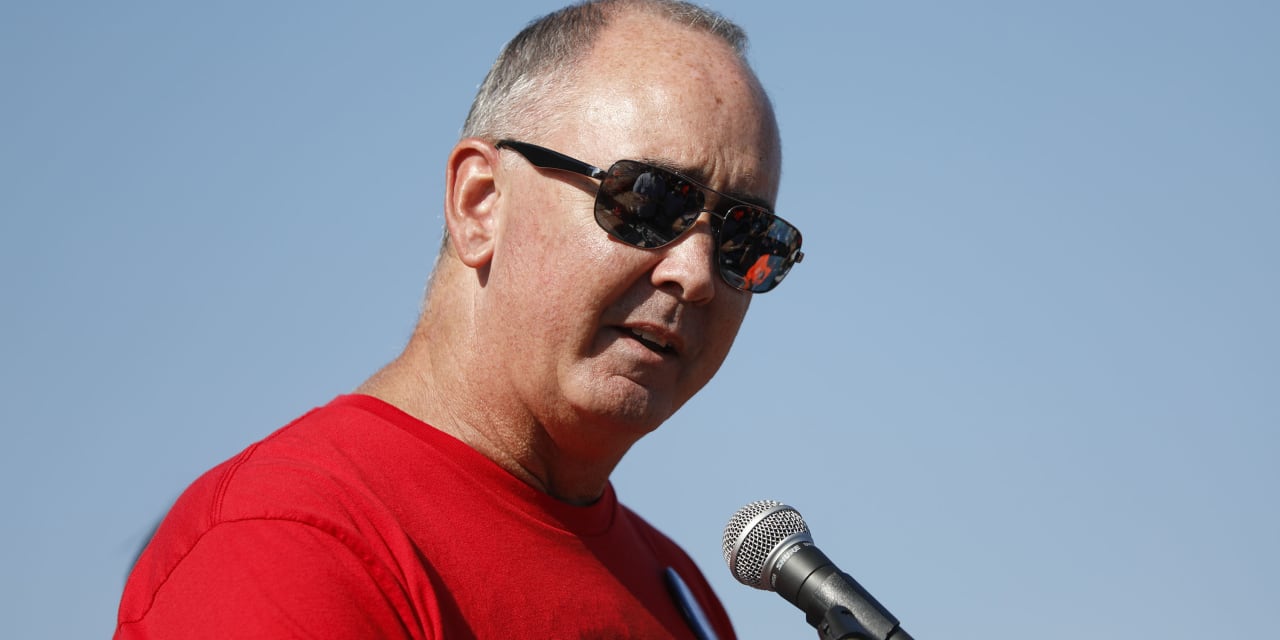The head of the United Auto Workers on Wednesday evening said the union and the Big Three automakers are still “very far apart” on the union’s key priorities for wage increases—and that the union is preparing to strike all three companies using new tactics after 11:59 p.m. on Thursday.
“We’re likely going to have to take action,” said Shawn Fain, the union’s president of five months, on a
Facebook
livestream.
Fain’s remarks elicited a strong response from
Ford Motor
CEO Jim Farley, who defended the counterproposals his company has put forward. That includes a “historically generous offer” that Farley said he and Bill Ford, the company’s executive chair, laid out on the bargaining table Tuesday.
To a group of reporters, Farley said the company hadn’t received a “genuine counteroffer” in return and that he was “concerned about the lack of feedback” during negotiations. “If there is a strike, it’s not because Ford didn’t make a great offer,” Farley said in a statement issued by Ford Wednesday.
Fain said the union won’t strike all facilities at once. The UAW leader is calling the new tactic a “stand-up” strike, in which local union chapters will be asked to strike at individual auto plants. Fain said it would create confusion for the companies and give the UAW added leverage at the bargaining table.
Contracts for the UAW’s roughly 150,000 members expire midnight Thursday with Ford Motor,
Stellantis
and
General Motors.
The union has demanded a 40% wage increase, spread out over the next four-year contract, along with cost-of-living-adjustments, job security measures, and retiree benefits.
“Altogether we are seeing movement from the companies,” Fain said. “But they’re still not willing to agree on the kinds of raise that will make up for inflation on top of decades of falling wages. And their proposals don’t reflect the massive profits that we’ve generated for these companies.”
The Big Three all said they want to reach a deal. GM said Wednesday that it has made “additional strong offers,” while Stellantis, maker of Chrysler and Jeep, said it remains focused on having a “tentative agreement on the table” ahead of the Thursday night deadline.
Farley put it this way: “We should be working creatively to solve hard problems rather than planning strikes and PR events.”
The UAW president said the union’s goal is a fair agreement, not a strike. But if there’s no deal, Fain said he’ll announce Thursday at 10 p.m. Eastern which local union chapters will be asked to strike first, while others keep working.
“Show the companies that you are ready to go on a moment’s notice,” Fain told union members Wednesday on the livestream.
The approach represents a departure from past negotiations, when the union would sign a contract with one of the Big Three first and leverage it to get similar deals with the other two companies.
The UAW has never initiated strike activity against all three of the auto makers at once. “We will strike all three companies—a historic first—initially at a limited number of targeted locations that we will be announcing,” Fain said.
Fain held out the possibility of massive strike action, beyond targeted locations. “An all-out strike is still a possibility,” he said. “We’re keeping all of our options open.”
If things get that far, a total strike by UAW members could cost the U.S. economy about $500 million a day, according to estimates from Joe Brusuelas, RSM’s chief economist. That’s a big sum, but not enough to bring on a recession, Brusuelas wrote this week.
Labor strikes are often averted at the last moment, but Fain’s unusually aggressive stance adds new urgency to this year’s talks. In 2019, a GM strike lasted for 40 days and cost the company an estimated $3.6 billion.
Write to Catherine Dunn at [email protected]
Read the full article here





